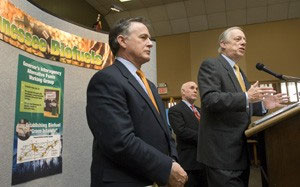 An all-day conference on biofuels was held Thursday by the U.S. Senate Committee on Energy and Natural Resources.
An all-day conference on biofuels was held Thursday by the U.S. Senate Committee on Energy and Natural Resources.
The conference featured six panels and 33 witnesses from industry, agriculture, infrastructure, research and development. Much of the testimony focused on the need for increased funding to develop cellulosic technology.
National Commission on Energy Policy Counsel David Conover told the committee they should restructure renewable energy subsidies to put more emphasis on cellulosic ethanol and less on corn-based ethanol, reports Dow Jones newswire.
“We certainly don’t want to demonize corn ethanol, because it’s certainly better than gasoline,” Conover told the senators, referring to ethanol’s air quality and energy independence benefits. “But federal subsidies really ought to be targeted to…the valley of death.”
Cellulosic ethanol, a motor fuel that can be produced from biomass like wood chips, switchgrass and corn stover, is one of those technologies in the so-called valley of death, he said. Conover pointed out that cellulosic ethanol plants are expensive and can’t compete with corn ethanol. Thus, subsidies would help boost the technology, he said.
 On the Emerging Biofuels panel, DuPont Vice President of Bio-Based Technology Dr. John Pierce provided an overview of the company’s strategy to accelerate biofuels production.
On the Emerging Biofuels panel, DuPont Vice President of Bio-Based Technology Dr. John Pierce provided an overview of the company’s strategy to accelerate biofuels production.
Pierce told the committee that DuPont’s three-part strategy entails: (1) improving existing ethanol production through differentiated agricultural seed products and crop protection chemicals; (2) developing and supplying new technologies to allow conversion of cellulose to biofuels; and (3) developing and supplying next generation biofuels with improved performance.

 Earth Biofuels Inc. of Texas and Imperium Renewables of Seattle were among the witnesses who discussed the infrastructue situation mainly from a biodiesel perspective. Earth Biofuels is the exclusive distributor for Bio-Willie and Imperium is largest producer of biodiesel on the West Coast.
Earth Biofuels Inc. of Texas and Imperium Renewables of Seattle were among the witnesses who discussed the infrastructue situation mainly from a biodiesel perspective. Earth Biofuels is the exclusive distributor for Bio-Willie and Imperium is largest producer of biodiesel on the West Coast.


 It seems like just about every state lately is getting into the biofuels race wanting to become a leader.
It seems like just about every state lately is getting into the biofuels race wanting to become a leader.  Shares for
Shares for 



 A word that few people even knew just five years ago when the last farm bill was written is all over the Bush administration’s
A word that few people even knew just five years ago when the last farm bill was written is all over the Bush administration’s 
 The
The  Also in Daytona to watch the test was Dan Schwartzkopf, senior vice president of
Also in Daytona to watch the test was Dan Schwartzkopf, senior vice president of 